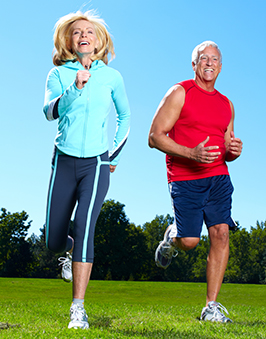Brilliant bones

How to keep joints and bones supple for life
One of the most familiar physical signs of ageing is aching hips and knees and soreness in our bones caused by reducing bone mass. Of course wear and tear – walking around on one pair of hips and knees for several decades, or serious sporting activity, can lead to soreness but there are natural ways to help yourself.
Orla Duffy is a Community Dietitian in the HSE and member of the Irish Nutrition and Dietetic Institute. “An adequate calcium intake at all stages of life, in combination with an active lifestyle will help ensure that bones are as strong as possible,” she says. “The Food Pyramid recommends that children and adults need approximately three servings a day, and low-fat dairy products have as much calcium as full fat versions. As vegans do not eat dairy products they need to take care that their diet contains sufficient calcium and choose from soya products, such as tofu and soya drinks, that are fortified with calcium to meet their calcium requirement.
“Vitamin D is essential for healthy bones because it aids the absorption of calcium from food,” says Orla. “It is mainly produced in the body by exposure of the skin to sunlight. However, because of Ireland’s northerly latitude, in the months between November and March there is an inadequate quality and quantity of sunlight to enable sufficient production of vitamin D by the body.
“Vitamin D is found in a small range of foods including oily fish, egg yolks and fortified foods such as milk and breakfast cereals and infant formula. In addition, offal meat such as liver and kidney is a good source of Vitamin D but these foods are not suitable for infants and pregnant women because they provide too much Vitamin A. Eating oily fish twice a week will provide approximately half your vitamin D requirement for the week.”
Orla says that people who suffer from joint pain should include omega-3-rich oily fish in their diet. Omega 3 fatty acids reduce the activity of enzymes that are responsible for damaging the protective cartilage around your bones and joints.
Diets low in antioxidants, particularly vitamins A, C and E, may predispose some people to joint problems. Supplement your diet with additional fruits and vegetables. “Most bone pain is caused by inflammation and taking natural anti-inflammatories such as ginger can help,” says Orla. “Consider incorporating ginger in your diet more often - have a cup of ginger tea, add it to stir-fries and curries, and it’s also delicious with stewed rhubarb.” Other good anti-inflammatory foods include olives, red onions and turmeric.
It’s common sense that carrying any extra weight will put added strain on your joints, so try to lose weight if you are experiencing pain or stiffness. Weight-bearing exercise such as walking is ideal.
Avoid drinking fizzy drinks as these leach the calcium from your bones.
Make sure you are eating enough protein from meat, fish and eggs as well as lentils, nuts, seeds, beans and chickpeas, as protein is also needed to maintain bone mass.
Consider taking up weight-bearing exercise such as walking or pilates which corrects the posture and strengthens muscles, alleviating pressure on joints.
Did you know?
- A groundbreaking study into how K2 (menaquinone-7) prevents bone loss and improves bone strength in postmenopausal women was published in Osteoporosis International recently.
- In total 244 women were included in the randomised study and divided into a placebo group and a group receiving one capsule of 180 mcg of MK-7 daily for 36 months. The bone mineral density was measured by DXA at the beginning of the study and after one, two and three years of treatment.
- After three years of supplementation, clear improvements were seen in the percentage of bone minerals and bone mineral density in the lower back vertebrae and the femoral head. Also the loss of vertebral height was significantly less and bone strength had improved.
- Dr Cees Vermeer, Principal Investigator for the study at VitaK laboratory at Maastricht University says, “This ground-breaking study shows that nutritional supplementation, with menaquinone-7 during three years, prevents bone loss in postmenopausal women. With this research we also confirm that the health benefits of vitamin K2 are best shown over longer periods than we first assumed”.
- The patented supplement which was used in the study contains natural vitamin K2 (menaquinone-7) extracted from a fermented food source. Menaquinone-7 is a special form of vitamin K2 which stays active for longer in the body and has a larger activity than other forms of vitamin K.
Bone-friendly supplements
- Vitamin D – helps get the calcium into your bones, but hard to get from food. Take a daily supplement and if you already have pain, go for a higher dose.
- Vitamin B12 – keeps levels of homocysteine (an amino acid linked to bone fracture) down.
- Glucosamine sulphate – found naturally around joints but only available to eat as the crushed shells of shellfish.
- Omega-3 fish oils – potent anti-inflammatories because they turn into type-3 prostagandins, which switch off pain and swelling.
- Vitamin K2 – see above for more on this.
- Ask your local health store for a bone-friendly supplement as there are a variety on the market.
Click here to read earlier Rude Health Magazine natural health articles.
Click here to read the latest issue of Rude Health Magazine.